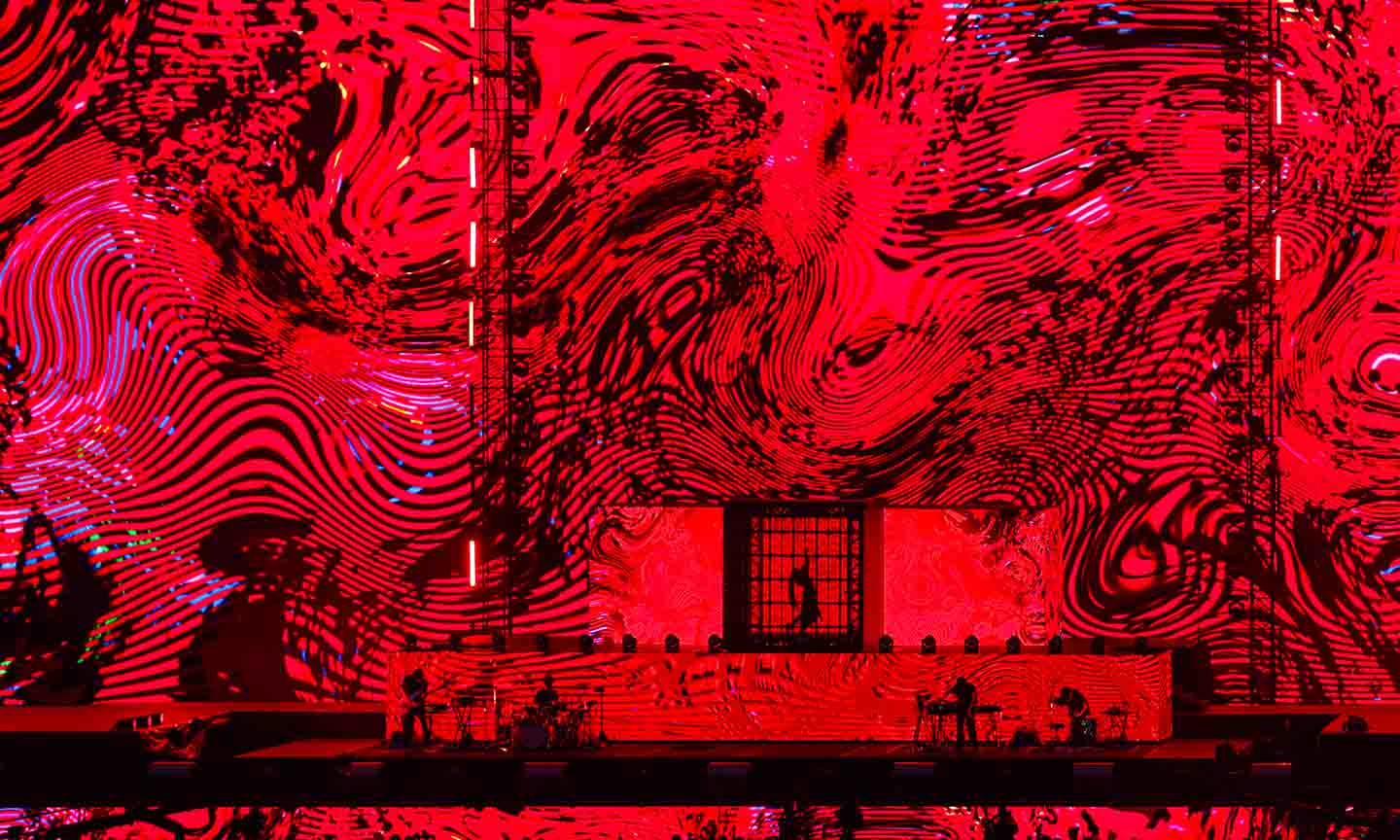Ado began her career uploading homemade cover songs to YouTube from her bedroom, before making her major-label debut in October 2020. Just three and a half short years later, on April 27, she played one of the biggest venues in all of Japan.
At the Japan National Stadium, a massive open-air stadium built for the 2020 Olympic Games, the platinum-selling Japanese star played a nearly three-hour set for 70,000 fans – the first of two nights titled Ado SPECIAL LIVE 2024 “Shinzou” that capped off her successful first-ever world tour.
Performing 25 songs, the young star showed an impressive mastery of her powerful voice. Opening song “Usseewa” – a sharp, brutal rejection of mainstream authority – began the show with aggressive screams. Later, on the dramatic “Aishite Aishite Aishite,” with its quiet verses punctuated by violent crescendos, Ado’s voice went from emotional whisper to raw scream to thick falsetto and back again. Hitting such a wide range of vocal styles on her recordings is one thing, but it’s mind-blowing that Ado could pull this off live – especially in a venue that was built not for live music but for soccer games.
It’s not only the range of Ado’s singing style that is diverse. Her songs, too, crash genre boundaries with glee. The lyrics to “Readymade” may share similar themes to those of “Usseewa” – rejecting societal norms to find self-empowerment – but far from the punkish charms of “Usseewa,” it is a jazzy show song. Ado swayed along to the rhythm and bent herself back into an arch at the end, becoming one with the groove.
Despite her superstar status, Ado keeps her identity anonymous and never shows her face. Her concerts offer a rare chance to see her in person, albeit only in silhouette against a huge video screen – but Ado was able to pull fans deeper into her world with an incredible visual spectacle, from dynamic video backdrops with sometimes dark, sometimes beautiful visuals to stunning rainbow-colored pyrotechnics. The demonic, fearsome song “Tot Musica” from “One Piece Film: Red” was made even more moody and atmospheric, almost Gothic, thanks to its video backdrop – on which ghostly skeletal arms and nightmarish giant skulls reached menacingly through the mist.
The lightshow even extended to the audience itself: Each attendee received a networked light-up wristband, programmed to light up at certain times. On “Domestic De Violence,” the sea of wristbands throughout the stadium flickered and pulsed in unison and then in staggered blocks of color, while on “Gira Gira,” a cosmic cyber starfield extended off the video screens, with selected glowing wristbands twinkling like stars among the heavens of the crowd.
Ado played with this concept even further by making multiple costume changes, each one giving her silhouette a different shape against the lights – from the long ponytail, platform boots, puffy-sleeved blouse and flowing skirt she wore inside her dancer cage in the middle of the stage, to a flowing spinaround dress that swept as she danced gracefully, to the tight flared trousers and translucent lace veils on the arms of her tuxedo jacket at the end of the show, light from the screens shining through to give tantalizing near-glimpses of Ado’s true form.
Once the sky above the open-air venue had gone dark, during the ballad ‘Eien no Akuruhi’, a squadron of drones high above put on an amazing light show, forming a pulsating, pumping, anatomically detailed heart. Over an extended orchestral coda, the drones changed formation to show an animated heartrate monitor display, a spiraling Milky Way, then a rose with intricate petals – a sort of planetarium representation of Ado’s world.
“Show” is a song about emancipation, and by now, Ado had emerged from the cage that held her during the first half of the set. During this party tune, with its deep bass and Bollywood-influenced bridge, Ado stalked the length of the oversized stage to sing closer to her fans. Next, another dancefloor banger, “Odo,” brought Latin rhythm, an Ibiza-anthem chant-along chorus and an EDM breakdown that got the crowd clapping along.
After speaking to the audience for the first time and professing her gratitude, Ado shrieked, “Are you ready for more?!”, before launching into “New Genesis,” her biggest hit to date, produced by Perfume cohort Yasutaka Nakata. The synthwave keyboards, tight drums and bassline of the verse gave way to a colossal chorus, pushing Ado’s stunning falsetto to maximum effect before ending in a magical glittering fireworks display.
During her six-song encore, Ado welcomed guest guitarist Takahiro Matsumoto from veteran Japanese rock band B’z to accompany her on “DIGNITY.” Then, on new song “Sakura Biyori to Time Machine” written by artist Mafumafu, she was joined on stage by Vocaloid Hatsune Miku for a duet and choreographed dance performance – with Miku fully visible while Ado remained in shadow. Miku thanked the crowd, waved and soaked up the applause, before being whisked away in a blitz of digital cherry blossom petals.
As Ado climbed into a roving carriage and drove slowly around an oval track through the venue, like a princess in a Disneyland parade, taking her closer to her fans as she sang, one thing was clear: Ado has come as far as possible from her days as a bedroom artist. Now a seasoned global performer, Ado showed she has what it takes to dominate any stage.




